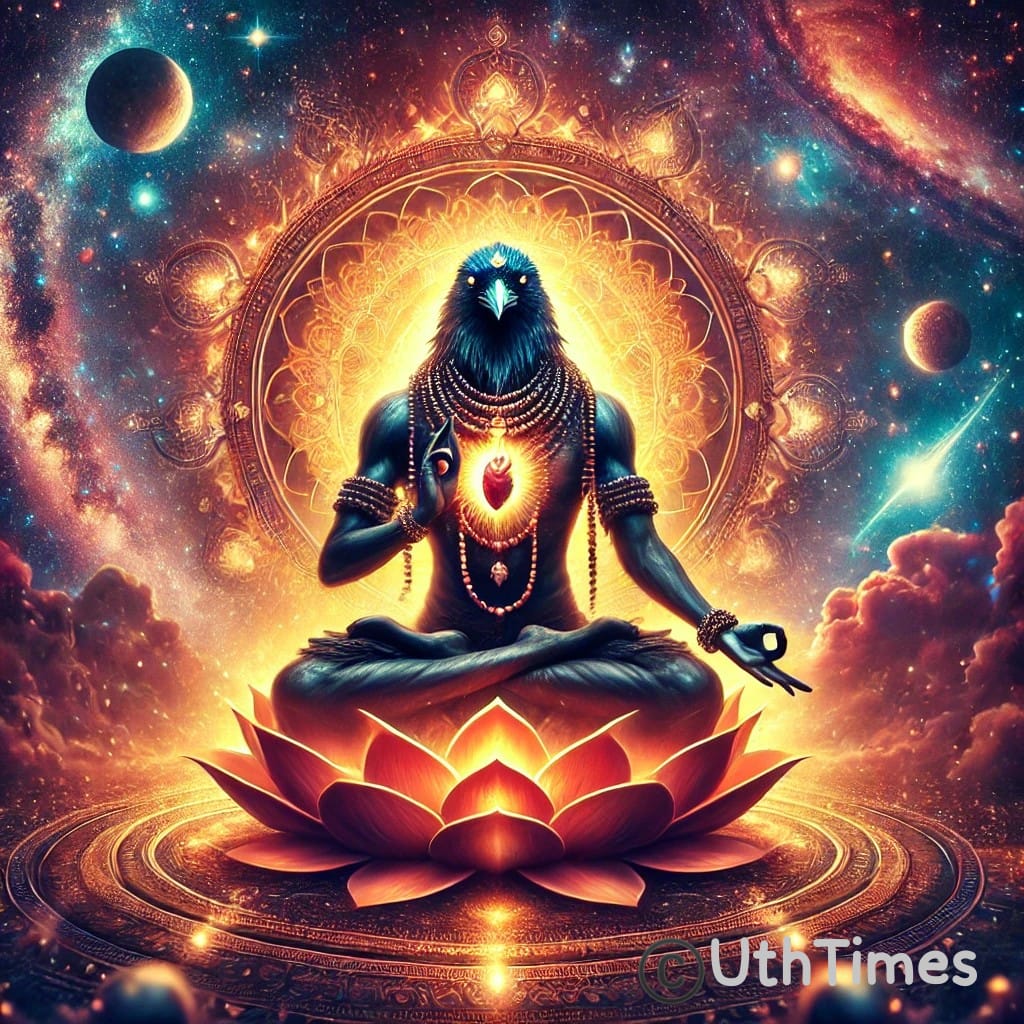।।KAGBHUSHUNDI – AN ETERNAL CROW MENTIONED IN THE HINDU SCRIPTURES।।🌺
Kagbhushundi, often revered in Hindu itihaas, is a unique sage known for his eternal form as a crow.
His tales are rich with spiritual wisdom, philosophical insights, and divine interactions, making him a significant figure in various scriptures.
Below are 7 Things about Kagbhushundi and the 7 Questions of Garuda to Kagbhushundi that every Hindu should know.
7 Things About Kagbhushundi
1. Divine Origin and Eternal Form
:Kagbhushundi is a celestial sage who, according to legend, took the form of a crow. His transformation is symbolic of his detachment from the material world and his deep spiritual wisdom.
2. Custodian of Mystical Knowledge:He is renowned for possessing profound knowledge of the Vedas, Upanishads, and other sacred texts. His wisdom encompasses both the philosophical and practical aspects of Hindu dharma.
3. Narrator of Sacred Stories:Kagbhushundi is credited with narrating several important tales from Hindu mythology, including detailed accounts of divine events and the lives of other sages and deities.
4. Symbolism of the Crow:The crow, in many cultures, represents intelligence, adaptability, and mystery. Kagbhushundi’s crow form emphasizes his role as a messenger between the earthly and divine realms.
5. Interaction with Other Deities:He is known to have interactions with various gods and divine beings, including Lord Vishnu and Garuda. These interactions often revolve around seeking wisdom or delivering divine messages.
6. Role in Preserving Dharma:Kagbhushundi plays a crucial role in maintaining the balance of dharma (cosmic order) by guiding seekers towards righteousness and spiritual enlightenment.
7. Teachings on Reincarnation and Karma:Through his discourses, Kagbhushundi imparts deep insights into the concepts of reincarnation, karma, and the soul’s journey, encouraging individuals to live virtuously.

7 Questions of Garuda to Kagbhushundi
In the rich tapestry of Hindu vedic itiihaas, dialogues between deities and sages often serve to elucidate complex spiritual truths.
Garuda, the mighty eagle and the mount of Lord Vishnu, posed several profound questions to Kagbhushundi, seeking deeper understanding.
Here are 7 Questions of Garuda to Kagbhushundi that highlight essential aspects of Hindu philosophy:
1. Question on the Nature of the Soul:”Oh Sage Kagbhushundi, can you elucidate the true nature of the Atman (soul) and its relationship with the Supreme Brahman?”
2. Question on Dharma and Duty:”What constitutes one’s dharma (duty) in the cosmic order, and how does one discern their path in times of moral dilemma?”
3. Question on Karma and Its Consequences:”How does the law of karma operate in the universe, and what are its implications for the actions of both gods and mortals?”
4. Question on Liberation (Moksha):”What are the paths leading to moksha (liberation) from the cycle of birth and death, and how can one attain it amidst worldly attachments?”
5. Question on the Creation and Maintenance of the Universe:”Can you describe the process through which the universe was created, sustained, and eventually dissolved, according to Vedic wisdom?”
6. Question on the Role of Deities in Human Lives:”What is the role of deities in guiding and influencing the lives of humans, and how should one seek their blessings?”
7. Question on the Integration of Knowledge and Devotion:”How can one balance the pursuit of intellectual knowledge with heartfelt devotion to attain spiritual excellence?”—
Insights from the Dialogue Between Garuda and Kagbhushundi
The exchange between Garuda and Kagbhushundi serves as a profound medium to convey essential spiritual teachings:
Understanding the Self: The discussions delve into the intricacies of the soul’s existence, its eternal nature, and its connection to the universal consciousness.
Ethical Living: Emphasis is placed on adhering to one’s dharma, the importance of righteous actions, and the moral responsibilities that come with power and knowledge.
Spiritual Liberation: The dialogue explores various paths to moksha, highlighting the significance of both knowledge (Jnana) and devotion (Bhakti) in achieving liberation.
Cosmic Order:
Insights into how the universe operates, the roles of different deities, and the balance maintained through cosmic laws are articulated.
Devotion and Knowledge: The integration of intellectual pursuits with heartfelt devotion is presented as a holistic approach to spiritual growth.
Conclusion
Kagbhushundi stands as a beacon of wisdom in Hindu mythology, embodying the seamless blend of intellect and spirituality. His interactions, especially with Garuda, offer timeless lessons on the nature of existence, duty, and the pursuit of the divine.
For every Hindu, understanding Kagbhushundi’s teachings and the profound questions posed by Garuda can inspire a deeper connection with the eternal truths of dharma and spirituality.
May the wisdom of Sage Kagbhushundi illuminate your path towards spiritual enlightenment and eternal peace.
